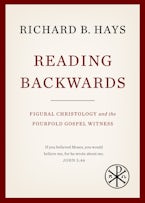Hays' thesis is as simple as it is ground-shifting: that the Gospel writers' portraits of Jesus depend on their hermeneutical appropriation of Israel's Scripture. And his approach is disarmingly straightforward: a sympathetic reading of the Gospels calibrated to hear both explicit and implicit scriptural resonances. With transparent exegesis and lucid prose, Hays persuasively challenges some of the basic assumptions and arguments in modern biblical studies.
~Joel B. Green, Dean of the School of Theology and Professor of New Testament Interpretation, Fuller Theological Seminary
Twenty-five years ago Richard Hays launched a quiet but highly effective revolution on how Paul read Israel’s scripture. Now he turns his attention to the four gospels, and we may confidently predict similar results. With his characteristic blend of biblical and literary scholarship, Hays opens new and striking vistas on texts we thought we knew--and, particularly, on the early church’s remarkable belief in Jesus as the embodiment of Israel’s God.
~N.T. Wright, Professor of New Testament and Early Christianity, University of St Andrews
Few people are better qualified than Hays to take us right inside the ways the Gospels interpret the Old Testament. And, as though that were not enough for one short book, his hermeneutical quest also delivers a christological result. He shows how, precisely in their reading of the Old Testament, each of the Gospels in its own distinctive way presents Jesus as the very embodiment of the God of Israel. Intertextuality and high christology turn out to be two sides of a coin.
~Richard Bauckham, Emeritus Professor, University of St Andrews
This is an exceptionally rich study, illustrating how early Christianity and, in particular, the four evangelists "read backwards" in their portrayal of Jesus' divine identity.
~Donald Senior, CP, Catholic Theological Union in Chicago, The Bible Today
This is a rich, rewarding, and challenging work. The main substance of Hays' argument is not only convincing but nourishing to Christian faith: many of Hays' readings undermine those of more skeptical scholars and align precisely with the instincts of faithful though not learned Christians.
~Bobby Jamieson, University of Cambridge, Credo Magazine
A masterpiece.
~Scot McKnight, Northern Seminary, Books & Culture
This book is such a gem that it may prove more widely influential than anything Hays has done yet.
~Jason Byassee, Senior Pastor at Boone United Methodist Church in North Carolina, The Christian Century
Reading Backwards is a wonderful book, offering the reader a succinct but potent experience with a contemporary and refined hermeneutical approach to Scripture that holds in tension critical and pre-critical sensibilities.
~Edward W. Klink III, Pastor of Hope Evangelical Free Church in Roscoe, Illinois, Books at a Glance
[Hays] is engaging, and he is nontechnical in handling this complex topic.
~Choice
The readings of each of the four Gospels that are presented in Reading Backwards provide a rich and concise survey in which each gospel distinctively uses scripture to paint its picture of Jesus.
~Neil White, Rejoice Lutheran Church, Word & World
Professor Hays is to be congratulated upon offering in this brief book a great deal more substantive scholarship than is provided in most books many times the length.
~Simon Gathercole, Reformation21
The insightful manner in which Hays analyses and summarizes the distinct ways in which the four gospel writers read the OT figuratively is a major strength of this highly recommended book.
~Marius J. Nel, Stellenbosch University, Neotestamentica
The strengths of Reading Backwards are obvious, and it will prove fruitful for anyone interested in Gospel studies, but also for studies in biblical theology and Christology more generally, as well as modern debates over what stratum of the Christian tradition first recognized Jesus' divinity.
~Nicholas G. Piotrowski, Journal of the Evangelical Theological Society
Overall, Hays’s exegetical work confirms 'what the church’s dogmatic tradition has classically affirmed about the identity of Jesus.' And it does so in an unlikely way, by pointing the reader to the narrative reflexes of Israel’s monotheism.
~Michael Legaspi, First Things
Richard B. Hays has always maintained a distinctive theological voice, even within his most specialized New Testament work. A remarkably lucid expositor of scripture and a salient (if somewhat controversial) voice on New Testament theology and ethics, Hays has always been important for theologians to read.
~Joshua Davis, Anglican Theological Review
Hays’s argument for the necessity of reading the Gospels in light of their Old Testament roots provides a helpful corrective to historical critical approaches that would insist on understanding Old Testament texts solely within their own cultural milieu. Instead, Hays argues clearly and coherently for understanding a connection between the Testaments by which the figure of Jesus is understood most fully only when set alongside of the Old Testament texts that the Gospel writers use to present him.
~Melanie A. Howard, Biblical Interpretation
This is an encouraging, intriguing, and stimulating book. Readers who are interested in interpretation and in learning lessons from the Bible itself about the nature of interpretation will find this a valuable companion for their reflections.
~Church Times
Hays opens up possibilities of reading and re-reading the Gospels, each time capturing additional layers of truth and beauty in already-familiar stories. Hays also paints a more appealing vision of Bible study, in which we need not be limited to mechanistic or simplistic methods of analysis but can bring in poetic sensibilities to our readings of the Gospels. Following Hays's lead, readers can then savor the outcome of this way of reading the Gospels: a renewed wonder regarding God's variegated, overarching plans for this world, centered on the humility and glory of Jesus Christ, Son of Man and Son of God.
~Gregory S. MaGee, Christian Scholars Review
Hays has made an excellent study of this subject. His insights are rich and interpretations are clear. His style of writing is appealing and the illustrations he gives are truly convincing. Yes, the Old Testament teaches us how to read the Gospels and likewise the Gospels teach us how to read the Old Testament.
~Dominic Mendonca, Revue Biblique

